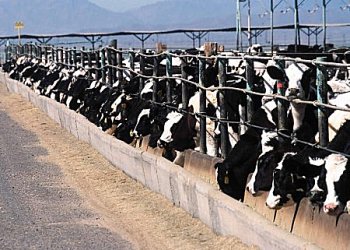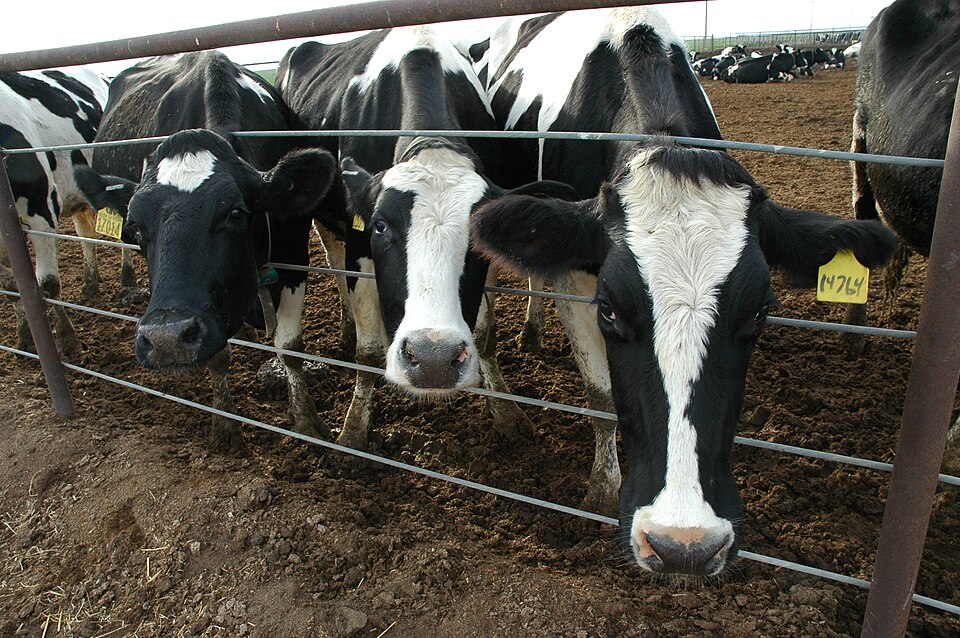The Terrible True Cost of Milk, Cheese, Butter, and Ice Cream
Countless dairy cows experience a shocking level of cruelty every day at factory farms.
Introduction
For more than two years, Erin Wing served as an undercover investigator for Animal Outlook, an animal advocacy organization nonprofit based in Washington, D.C., during which time she conducted multiple investigations, including one of a dairy factory farm in 2019, after which Nestlé dropped the farm and added more vegan options. Her final assignment before choosing to leave the field was to document the cruelty to cows happening every day behind closed doors at Dick Van Dam Dairy, a massive factory farm in San Jacinto, California. Wing recently revealed her true identity, writing in October 2020, “I’m now stepping out of the shadows to shine a light on the stomach-churning horrors I witnessed.”
Using a hidden camera, she documented shocking cruelty, from cows being violently kicked, jabbed, and shocked by workers, sick cows producing blood-tinged pink milk, calves covered in flies and left to languish in the mud, and a lack of euthanasia or veterinary care, leaving sick cows to slowly die, with their dead, decomposing bodies left among living cows. In addition, Wing documented “downed” or “spent” cows—cows who are so sick, injured or weak that they are no longer able to stand—dragged by chains and painful “hip clamps,” lifted over walls using tractors. These downed cows, who are no longer useful to the dairy industry, are often killed for their meat. This tragic reality is a reason that “ethical vegetarians” who consume dairy products are actually supporting the beef industry: About a third of dairy cows are ultimately killed for their meat.
Profit Over Compassion
“This is where milk comes from—a profit-driven industry that treats these gentle, smart, and social animals like mere milk-producing machines or unwanted by-products,” Wing writes. After reviewing the investigation, the Animal Legal Defense Fund, an animal law nonprofit based in Cotati, California, filed a lawsuit against Dick Van Dam Dairy in September 2020 and the individuals caught on camera for violating California animal cruelty laws and the San Jacinto Municipal Code through the neglectful treatment of cows and calves.
While animal cruelty in the industrialized food system is rampant—factory farming is the largest cause of animal abuse in history—consumer views on the treatment of farmed animals changing. Nearly half of Americans would support a ban on the factory farming of animals, according to a 2017 poll, with 70 percent having “some discomfort with the way animals are used in the food industry.”
In January 2020, prominent lawmakers in Washington decided to take action. Senators Cory Booker (D-NJ) and Elizabeth Warren (D-Mass.) joined forces to advance federal legislation that would ban large-scale factory farming in the United States over the next two decades. The Farm System Reform Act seeks to place a moratorium on large-scale factory farming. It would also strengthen the Packers and Stockyards Act of 1921 to require country-of-origin labeling on beef, pork, and dairy products. Rep. Ro Khanna (D-CA) is also co-sponsoring the effort, introducing companion legislation to the House of Representatives.
Shifting Public Attitudes
These shifting public attitudes are resulting in an increased demand for plant-based (i.e., cruelty-free) milk, which is putting the future of dairy farming into question. In 2019, the U.S. saw the largest annual decline in the number of licensed dairy operations in more than 15 years. “The recent acceleration of the decline reflects how difficult it is to operate a dairy, particularly in the last several years,” reported the American Farm Bureau Federation, a lobbying group representing the U.S. agriculture industry, in February 2020. “Since the end of 2014, dairy farmers have struggled with low prices resulting from large supplies outweighing demand, in the U.S. and around the world.”
Dick Van Dam Dairy supplies milk to Dean Foods, America’s largest milk processor, based in Dallas. In November 2019, the company filed for bankruptcy. Most of its assets, including the brands Alta Dena and TruMoo, are now owned by Dairy Farmers of America, the nation’s largest dairy cooperative. “Dean Foods’ business has struggled as more consumers turn to non-dairy milk,” writes Amelia Lucas of CNBC, noting that the U.S. Department of Agriculture data shows that Americans’ milk consumption has fallen 26 percent over the past 20 years.
Our Broken and Inhumane Food System
While the steady move away from dairy is something for animal advocates to cheer about, we are a long way from reforming our broken and inhumane food system. In the U.S. alone, nearly 10 billion land animals are raised on factory farms and killed in slaughterhouses every single year, accounting for 99 percent of farmed animals in the nation. In the U.S., there are approximately 9 million dairy cows. But these cows are far from just numbers—every one of them is an individual, with an individual personality. Dr. Marc Bekoff is a professor emeritus of ecology and evolutionary biology at the University of Colorado, Boulder, and the co-founder with Jane Goodall of Ethologists for the Ethical Treatment of Animals. He writes on Psychology Today that cows are “highly sentient and intelligent individuals with markedly different personalities … display[ing] a full range of personalities including boldness, shyness, sociability, and gregariousness.”

But confined and abused in our inhumane food system, they are treated as nothing more than capitalist objects. Betty Stoneman, who teaches philosophy at Emory University, wrote an essay in 2015 applying Marx’s theory of “estranged labor” (i.e., workers’ alienation from the products of their labor) to animals on factory farms. She writes: “On factory farms animals live confined to small cages, unable to enjoy the full range of their possible movements and among their own waste. Animals undergo painful physical modifications designed to enhance their productivity and to combat the stress reactions they develop due to their living conditions.
Animals are deprived of being able to live their lives as they naturally would either as individuals or as members of social groups.” This misery is generally kept hidden from the public, with the factory farm industry in several states shielded by anti-whistleblower legislation, known as “ag-gag” laws.
Additionally, the lack of effective government oversight of factory farms has led to a public health crisis: the rise of antibiotic-resistant diseases in humans.
Dairy Cows Are Also Mothers
It is worth remembering that a dairy cow is also a mother, with maternal instincts to care for and defend her young. Forcibly impregnated so that she is kept in a constant and painful cycle of pregnancy, birth and lactation, this poor, abused mother must also suffer the relentless theft of her babies, who are taken away from her within hours of their birth. “This forced separation often causes cows to bellow for hours or even days, pacing and searching for their calves,” writes Joe Loria of Mercy for Animals, a nonprofit that, like Animal Outlook, has been at the forefront of exposing the behind-the-scenes horrors of factory farming.
“I saw abuse and neglect every single day,” Wing said about her harrowing undercover mission. “I feel a special bond toward cows now because of it, and it will always stay with me. A part of me will always be with them as well.”



